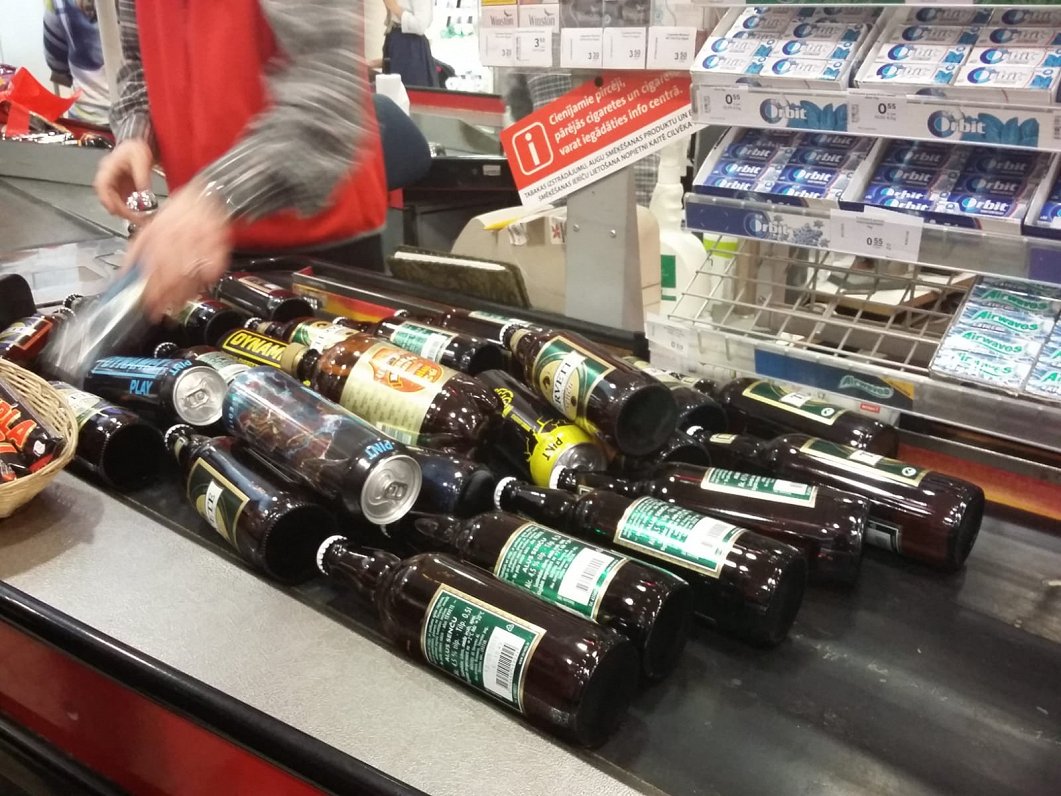Latvian Traders Association's co-leader Dainis Domiņš said that the situation is tough: alcohol is a big part of the profits of rural shops.
"The information is obtained directly from traders, from small rural shops, many of which are also members of the association. This was what most small shopkeepers said – alcohol in principle carries the whole trade burden because alcohol is the one with the highest mark-up. And it is often able to offset, for example, the very minimal mark-up for dairy products. In principle, alcohol keeps small shops alive. It's harsh, but it is the reality," Domiņš said.
The Elvi network works on a franchise basis and has many stores in rural areas. Its representative Vineta Grigāne-Drande said that though alcohol and tobacco are among the most demanded goods, most are other goods. However, Mareks Kronbušs, who owns four shops in Bauska and the vicinity, had the opposite to say.
“We've looked at the six-year, annual and two-year cut top 10 goods, in which not a single one is a food commodity. There are beers, cigarettes, and, unfortunately, vodka,” said Kronbušs. Mareks explained the top 10 goods in one of his shops in Mežotne between the beginning of March and end of June: first place is taken by beer, then vodka, beer again, cigarettes, another beer, cigarettes from sixth to eighth place, beer again in the ninth, and cigarettes in the tenth place.
Kronbušs said people don't do their shopping in rural stores, everyone drives to cities. He does not want to reduce the assortment and standards of the Mežotne shop, but he does not have the answers to why people don't come to the local store, which contains all the necessary goods and even more. Food is purchased relatively rarely here.
The head of the Mežotne store Dace Kronbuša recalled the events during last season's peak Covid spread. Then there was a ban on alcohol sales during certain periods, and that showed the real situation.
“We didn't have buyers at that time. We had very few. It was the days when alcohol and tobacco could not be sold. That means that people come more to get alcohol and tobacco,” Kronbuša said.
But what do the local residents think about the situation? In Mežotne, they mostly agree with the shopkeepers.
I think there's a lot of booze buying everywhere.
In a sense, yes. Alcoholics, well. When they have money, then they go at it. They're not interested in food. Everywhere it happens.
Yes, for sure it happens. Yes! That's how it is rurally. Everyone buys booze – beers, vodka. Food products are...
Absolutely not. In the summer, maybe more. Local drinkers aren't all that many.
I personally don't, but beers are bought by local guys who don't work. One chopped wood for me, for example, and I had to pay him 2 euros so he can get a beer. He's already figured out how much I should pay.
In the meantime, in the nearby Rundāle, sellers said that alcohol was not the most demanded good, and the selection was also relatively small.
Ministries ping-pong the issue
Sanita Lazdiņa, senior expert at the Health Ministry's Health Promotion and Addiction Prevention Division, said – the Ministry has already proposed to shorten the selling hours of alcohol. Then, the Ministry of Economics objected, as it would shorten the working hours of the stores. The statement was not based on research. Lazdiņa said that in the near future, the ministry pledged to implement a study that would respond to a series of other issues related to alcohol consumption.
"We will look at what the benefits to health-care system might be, by introducing concrete interventions. And there, one of the interventions is advertising. There's also a plan to look at what happened if we raised the age limit or decreased the hours. Then it's about reducing the allowed blood alcohol concentration for drivers and another about excise duty," the expert said.
Lazdiņa also said that similar studies around the world are very common and demonstrate the effectiveness of the limitations. However, the Ministry of Economics is often in charge of objecting to any restrictions, precisely because such studies have not been carried out in Latvia, which is why it is currently being planned.
Meanwhile, the head of the Economics Minister's office Artūrs Butāns said any special restrictions on rural shops would not be supported from the ministry's point of view but that the Ministry of Economics strongly supports the reduction of alcohol consumption.
"We just have different visions of how this problem should be addressed. We believe that what the Ministry of Health is now offering is more of a burden for entrepreneurs, not a real solution. Essentially, alcoholism, which has taken over much of society and is a legacy of Soviet times, has actually been neglected as a problem for 30 years. We believe that youth should be worked with in social campaigns," said Butāns.
























